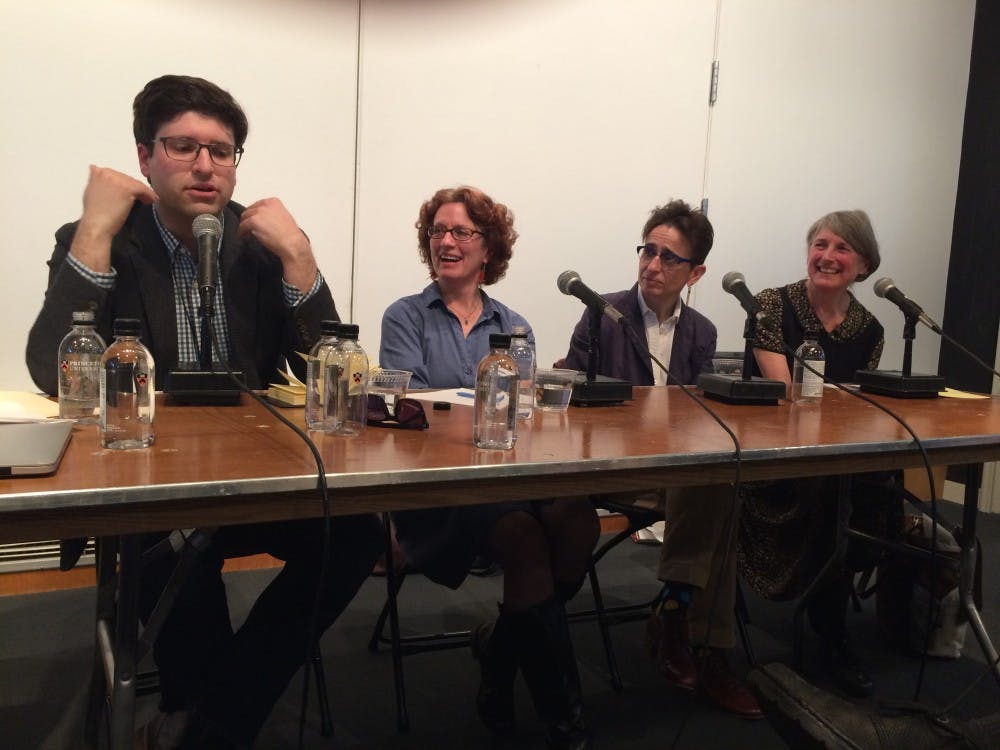Panelists in a conversation about the relationship between President Donald Trump and Russian President Vladimir Putin argued that the countries’ political and economic situations are notably similar in some respects, especially the poverty facing some Trump and Putin voters.
One of the panelists was Russian and American journalist Masha Gessen, who teaches at Oberlin College. She has worked as a journalist, author, translator, and activist, and is a major critic of both Vladimir V. Putin and Donald J. Trump. Her current work focuses on the relationships between both leaders' political messages, and on election night, she wrote a widely-read article on how to survive autocracy.
Other panel speakers included Sean Walker, Moscow correspondent for The Guardian, and sociology professor Deborah Kaple *91.
Gessen said that during the Cold War, the United States and Russia were evenly-matched enemies and that the space race revealed the increasing relevance of both powers. She added that the fall of the Soviet Union then ushered in a dichotomy of Western winners and post-Soviet losers that pervaded the 1990s.
She explained that now, the newest evolution of Russia-U.S. relations is becoming clear: the United States is experiencing a governmental collapse comparable to the fall of the Soviet Union, and the leaders of the U.S. and Russia are coming to see eye-to- eye on a long list of issues.
The panelists publicly engaged in a search for the meaning behind the current relationship between Trump and Putin. Both men rely on ostentatious displays of wealth and power, argued Gessen, but at the strategic level, “Putin is the dictator that Trump plays on T.V.”
Discussion turned to the role the Russian government played in the U.S. election, about which the U.S. intelligence agencies have filed a report. Gessen acknowledged evidence of Russian influence in the election of Donald Trump, but took conversation down a different path, arguing that Putin is an opportunist, not a strategist.
She explained that if Putin did indeed want Trump to be elected, he got what he wanted, but now he has no idea what to do with his prize.

Gessen shed light on the ways through which the election of Trump could prove to be harmful to Russia.
She claimed that in the aftermath of November, Putin is no longer seen as the most unpredictable world leader. Now that leader is Trump. Putin can no longer rely on the political strategy of blaming the U.S. for all of Russia’s problems — largely because Trump is not anti-Russian — and that now, given the role Russia played in electing Trump, any foreign governmental contact with Russia that would have previously been seen as unproblematic is now viewed as toxic.
Meanwhile, Gessen argued, Trump is leading the United States into an age that has the potential to be characterized by an “eternal present.” Gessen said that one of the most damaging things about the Trump presidency is that he causes us to focus on his latest tweet more than the long-term impact of his policies.
Caryl Emerson argued that if Putin is an opportunist instead of a strategist, Trump is neither. She referenced an article written by Gessen in claiming that a Trump-Putin era will be worse than the Cold War, noting, “Because during the Cold War at least you had two sides that had an ideology and incorporated a vision of the future, you know what you’re working with, maybe not facts, but reasonable projections. Now you’ve got two people who don’t have any interest in the future at all, don’t seem to have any policy that shows that sort of commitment to a stable thing.”

Panelists addressed the paradox of Russian support for Putin, given poor economic conditions in much of the country. Walker gave accounts of speaking to Russians living in houses that lacked plumbing but who nevertheless said they were happy with Putin. He explained that the poor conditions in post-industrial areas of the U.S that helped elect Trump are similar to conditions currently affecting Russians living in provinces away from Moscow and St. Petersburg. He added further that while economic conditions in both the U.S. and Russia are increasingly topics of political discussion, the policies aimed to respond to these challenges often do not actually improve the economic conditions of these people.
Questions from the audience led to a discussion about “cracks in Trump’s armor,” as well as a conversation about how American citizens can most effectively fight back against the Trump administration. Gessen explained that talk of impeachment is pointless, arguing a Republican Congress will not impeach a Republican president, even if Trump’s ties to Russia can be successfully used as grounds for impeachment.
“The kind of resistance that we have seen to the Muslim ban, it’s very important to understand that resistance invigorated the courts. The courts would not have acted if it weren’t for the people in the streets and for the ACLU lawyers, right?” said Gessen. “The judiciary institutions are not designed to deal with bad-faith actors, they fold, right?” she added.
Gessen argued that resistance to Trump should also come from local and state politics.
“It’s important psychologically,” said Gessen. “As Trump raises an assault on the American identity, it’s important to have a local identity.” She referenced sanctuary cities and urged the audience to have a personal local identity that is open to all.
The panel-style, question-and-answer lecture was delivered to a large audience composed mostly of older individuals from the town. The talk was moderated by music professor Simon Morrison and Slavic professor Caryl Emerson. The lecture took place in Betts Auditorium at 4:30 p.m. on March 9.








